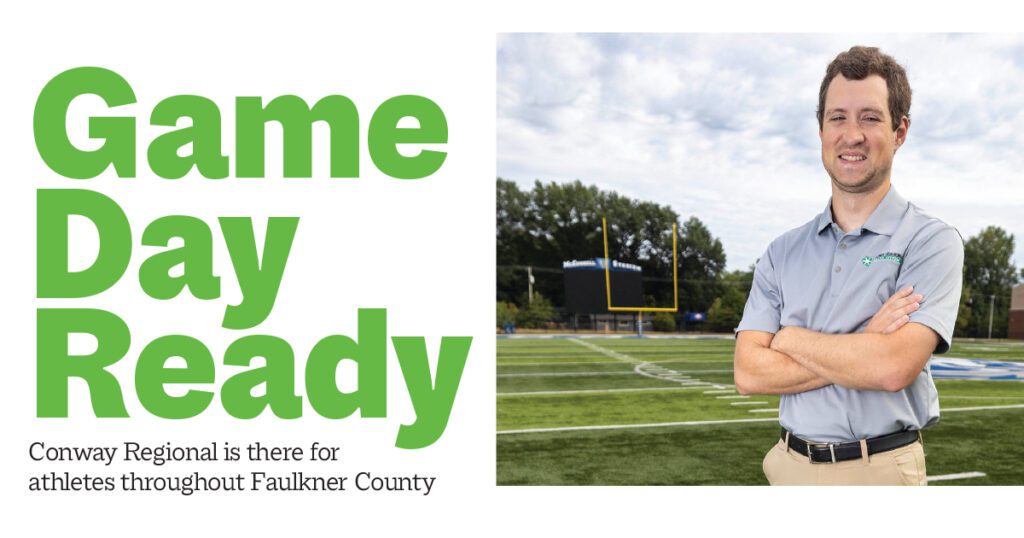09 Oct 2023 Game day ready
Whether it’s on a bus bound for Kentucky, at an early morning practice in August, or at a late game in November, Conway Regional’s athletic trainers are among the busiest people in sports.

The trainers provide physicals to most high school teams in Faulkner County and athletic training services to the Hendrix Warriors, Central Baptist College Mustangs, Conway Wampus Cats, Greenbrier Panthers, Vilonia Eagles and Conway Christian Eagles. They spend many late nights and early mornings away from home August through May.
“It’s fulfilling work. You must have an understanding family, really love what you do and care about the athletes,” said Ryan Most, who manages the staff of 12 athletic trainers. These individuals work behind the scenes preparing athletes to play sports from football to volleyball to lacrosse, treating injuries during the games and helping players recover from exhaustion and injuries. “If somebody gets hurt, the athletic trainers are right there to evaluate them and see what care they need,” Most said.
The trainers also screen athletes at Hendrix and UCA for heart issues using EKG equipment from the Conway Regional Cardiovascular Clinic. The EKG images are reviewed by Don Steely, MD, an interventional cardiologist, who follows up with the athletes for additional testing when abnormal images are found. “The idea is to minimize the risk for a cardiac event,” Most said.
“We are fortunate to have a lot of great physicians who support athletic training,” Most explained. “They go out to the games. If we need a second opinion on an evaluation or something beyond our scope of training, they can handle it. They are also a great resource for injured athletes and their patients.”
Their care is not reserved exclusively for the home team. During a Hendrix football game last year, trainers from the visiting team requested an evaluation, and Grant Bennett, MD, an orthopedist with Conway Orthopedics and Sports Medicine Center, was on the sideline.
“Dr. Bennett was able to determine that the athlete needed to be in a boot and on crutches to avoid bearing weight on the injured foot because he had possibly refractured his ankle,” said Most. “Since they were eight hours away, it was important for us to have Dr. Bennett there. They were very thankful.”
Several other physicians provide sideline coverage at area sports games including Tom Roberts, MD, orthopedics; Thad Hardin, MD, family practice; and David Naylor, MD, family practice.
In-game care is not the only advantage of having an athletic trainer available. Conway Regional athletic trainers work with coaches to develop plans for the overall care of all the athletes and help individual athletes recover from injuries. “We might work with the coaches to adjust how long a practice goes, what they are doing, or what they wear during practice,” Most explained.
“At the end of the day, everyone wants to ensure the safety of our young athletes.”
Warning Signs of Injury
Some symptoms of injuries only appear once athletes are at home or in class. Most listed some of the warning signs of heat injuries:
• Excessive sweating (Also a lack of sweat when it should be present can indicate the late stages of heat stroke.)
• Red, discolored skin
• Falling in and out of consciousness
• Inability to speak well
• Being delirious
• Feeling lightheaded or dizzy
Concussions
Athletes may not have symptoms until two to 24 hours after a collision. If they are at home and all of a sudden, they start feeling bad, “I would advise them to let their athletic trainer know,” said Most. “For the parents, it’s always good to ensure their athletes eat well and drink enough water. That’s important for your body to recover and heal itself.”
Citing the International Conference on Concussion in Sports recommendations, Most said, “You don’t need to wake them every two hours or keep them from sleeping. Recommendations are to get plenty of rest within the first 24 hours of a concussion.”









